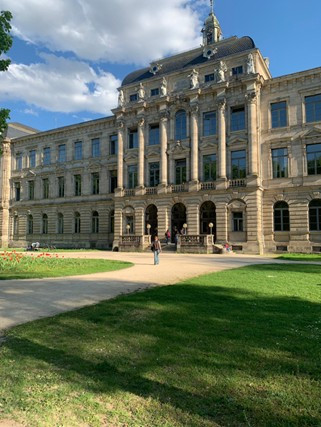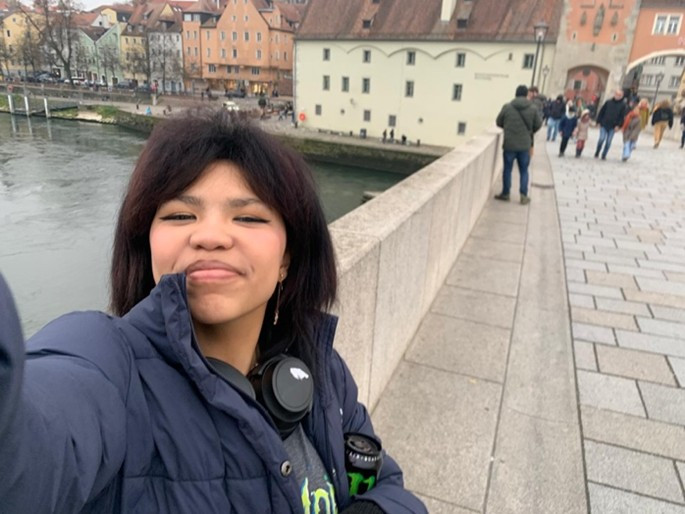Bürgschaft für Studentenvisum
Die Stiftung Deutsche Bildung (SDB) möchte Schülern die Möglichkeit geben, in Deutschland ein Studium aufzunehmen. Dafür übernimmt die SDB eine Bürgschaft, die für das Studentenvisum erforderlich ist.
Die Zielgruppe sind Absolventinnen und Absolventen der Deutschen Internationalen Schule Johannesburg, die im vergangenen Jahr ihren Schulabschluss gemacht haben, jedoch keine deutsche Staatsbürgerschaft besitzen. Diese Schüler müssen für die hohen Visakosten selbst aufkommen. Voraussetzung ist, dass sie ihre Lebenshaltungskosten während des Studiums in Deutschland eigenständig finanzieren können. Nicht tragen müssen sie hingegen die zusätzlichen Kosten der Bürgschaft, die vom deutschen Staat im Rahmen des Visumsantrags verlangt wird (11.208 €, Stand Juli 2024).
Feedback einer DSJ Schülerin
My first year abroad studying in Germany has been more enjoyable than I thought it would be! I spent the first year studying Political Sciences and History in Erlangen, Bavaria. Erlangen is a small city composed mostly of university students, which helped when it came to building a new community here. The International Student Network connected me with students from all different fields of study and countries. The connections I have made with all kinds of students have been unforgettable.

Studying at Friedrich-Alexander-Universität, Erlangen-Nürnberg means learning in buildings that have been around for hundreds of years, such as the Kollegienhaus in Schlossgarten (photo above). The lectures are engaging and there is still enough time left over in my week to enjoy what the rest of the city has to offer. Although I felt intimated at first with the constant use of German, this experience has improved both my academic and conversational use of the language. Plus, getting my Abitur at the German School familiarised me with the methods used in teaching and testing at the university level, which made the transition from high school to university much smoother.
When I’m not in lectures, Erlangen always has something to offer. Whether it’s the weekly international student meet-up (Stammtisch) or the annual festival, Bergkirchweh (which is the longest running Beer Festival in Germany). Berg was such a lovely experience and it reminded me a lot of our annual Basar at the School. Eleven days of Beer, live music and carnival rides was the perfect way to kick off the summer!
I have not just stayed in Erlangen; I have also done some travel throughout Germany. I’ve been to Munich for a concert, Scheessel for a music festival and have made multiple trips to the neighbouring city, Nürnberg, for the museums and other sights. I even left the country, heading to the neighbouring Czech Republic to visit Prague in May. Living in Germany has opened many doors to traveling the rest of Europe.
Despite all the lovely experiences I’ve had, there are a few downsides and things that I miss from back home. Mainly, the weather! This summer had a few weeks of extreme heat (up to 35 degrees) and rained often, leaving just a few weeks of liveable weather. The cold during the winter is just as bad, but I much prefer the snow and long nights over the heat and longer days. As much as I love the train system, Deutsche Bahn is notorious for being late. Consider yourself lucky if you take a train and it departs on time!

The Stiftung Deutsche Bildung has provided me with the amazing opportunity to study in Germany where I’ve made unforgettable experiences and can’t wait to make many more over the course of the rest of my studies.
Liam J, August 2025
Erfahrungen aus der Sicht der Mutter
My experience as Liam’s mom to get her to Germany to study as an international student from South Africa without European citizenship.
Getting Liam to Germany was a challenging process that unfolded successfully with the assistance of several truly selfless and helpful individuals and the Stiftung Deutsche Bildung.
Our journey started in March 2023. We met Mrs Anja Gutmayer at the Olympiade opening ceremony, where Liam was the Master of Ceremonies. Anja told us about the Stiftung and what they do. Even though I had worked at the school as a teacher, I didn’t know they existed or the work they were doing. Later, another former colleague of mine, Frau Keck, also spoke about the Stiftung and mentioned that Frau Kanwischer had recommended we apply.
We needed to submit an affidavit listing all the requirements that we needed to meet, which was done effortlessly by Herr van Wyk at DSJ. Liam was eventually granted surety from the Stiftung in the form of a letter that the Stiftung would stand surety for her, enabling her to study in Germany.
Liam applied to three different universities in Germany and was accepted at two of them. Strangely, in Germany you must first have medical aid before you can be accepted and medical aid will only accept you if you have been accepted by a university. This was very unsettling for me. Nonetheless, I contacted Frau Keck and she did the research for affordable medical aid and sent us the options. We made our choice, and Liam contacted her first preference. When they didn’t respond, she reached out to the second option.
In June 2024, Frau Springer travelled to Germany during the school holidays and kindly took copies of Liam’s results and passport with her; this was necessary because the South African postal service is unreliable. In Germany, everything runs through the postal system, which was an adjustment for us. Frau Springer posted the documents to Frau Keck, who then sent them to the university. In June 2024, Liam was accepted at FAU in Nürnberg-Erlangen; she accepted their offer.
In early August, our liaison from the Stiftung, Mr. Johannes Gutmayer, informed us that the German Embassy in Pretoria would not accept the surety letter from the Stiftung Deutsche Bildung; they insisted that the full amount required as per German government regulation for non EU citizens to cover 12 months of study to be deposited into a blocked account in Liam’s name in Germany. So the surety letter was converted into an interest-free loan from the Stiftung Deutsche Bildung to Liam. The full amount was made available for the visa application. Opening the blocked account was an online process, and we chose to go with Expatrio.
We attended the embassy appointment before the money had arrived in Liams’ blocked account in Germany. Fortunately, they gave Liam an email address where she could send the blocked account details and payment receipt. That part of the process turned out to be less stressful than expected. At the embassy, Liam was told there would be no waiting period, and that the visa would be processed as soon as the outstanding document was received; which was a great relief.
Next, we had to deposit the money into the blocked account in Germany. We tried the first time, but Expatrio only had two options: either the full amount or a partial amount. As a result of me fiddling around with the account, Expatrio temporarily blocked us from making further deposits. Once again, a former colleague, Frau Bӧkamp, stepped in. She called them, explained the issue, and they lifted the block. We were then able to send the money, including their bank fees.
It was disheartening to see how weak our currency is against the Euro. Still, we stayed focused on our goal and booked Liam’s flight for September 27, 2024.
While waiting for the visa, we searched for accommodation for her. She got accommodation easily and paid both the deposit and rent for September and October in advance. On September 25, 2024, we collected the visa and Liam left two days later.
Before her arrival in Germany, Liam emailed to ask how she would access her accommodation and was told that she wouldn’t be able to move in over the weekend. Again, Frau Bӧkamp stepped in - she booked temporary accommodation for Liam and even told her which bus to take. When Liam arrived, she went to the hotel. On Monday morning, Frau Bӧkamp collected her and took her to the dormitory.
We were immensely impressed with her kindness, she even took Liam shopping and brought along stuff like crockery, utensils, bedding and more with her so Liam could settle in. These were things that we obviously couldn’t send in her suitcase. In addition, Frau Bӧkamp also assisted us to sort out the medical aid problem, where Liam inadvertently had two medical aids; the first one she contacted who didn’t reply sent her a bill although she was paying her second option on a monthly basis.
So, this was my experience, very difficult and at times hair-raising. But in the end, everything worked well. Liam is happy and enjoying her studies and town she now resides in.
Just some advice for the future students, it is important to have contact with someone in Germany , who can post documents, help you settle in and also liaise with German authorities if the need arises, because the language barrier can create some challenges.
Claudia J, August 2025
